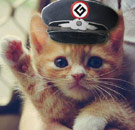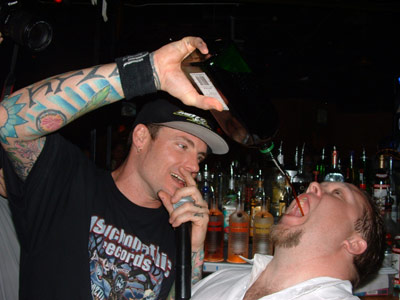German is a confusing language. Some things make perfect sense, while other grammatical concepts were clearly conceived after an all-night opium bender in one of the seedier parts of a rape dungeon. The spelling is great as soon as you get used to the umlauts and what have you; I mean, it's way more logical then most English spelling. But then you have the articles and word genders that exist for literally no other reason than to say, "Hahaha, you want to learn our language? Well we literally couldn't think of a better way to tell you to go fuck yourself than by making up these goddamned articles. Have fun sounding like an Olympic glue sniffer for the rest of your German ‘speaking' career."
But throughout all of the exploding bullshit factories of grammatical confusion, there are a few wonderful German words thrown in to help alleviate the stress, and simply make you giggle. Here are a handful of those German sprinkles…
1. Redenschlager
Schlager is the German word for "battle," and along with it, all of the bloody imagery that conjures up. Thousands of Barbarians charging into the heat of war, slicing and dicing their equally buff bodies into shreds. Maybe some mages shooting firebolts down. Probably a dragon or two, for good measure. Probably not even fighting. Maybe just fuckin'. Dragon fuckin'. But the presence of dragons always makes battles way more interesting. Even if it's just two fornicating, largely disinterested dragons rolling around on a hillside far from the actual battle.
It's the second part of Schürzenjäger that you'll recognize, even if it usually lands you in an alleyway behind one of the less reputable fuckhouses in Soho.Dragon porking aside, battles are awesome.
And reden? What does that mean? Probably something like, "murderfuck." Or one of those equally oft-used English words. Like, "forcefully," dark-wizard-ly," or "gonadually."
So which one is it?
Well, reden actually means "to speak." That's it.
Really.
So…speaking…speaking battle? Um…what?
Well, the more accurate term is "debate."
That's right, they actually have presidential word battles, and they're taken completely straight-facedly, regardless of the fact that they sound like some sort of grunt-intensive anime sequence.
2. Schadenfreude
This one is actually becoming a little more popular Stateside, mostly because of its general hilarity, but also because it's just so damned fitting. Hell, even my spellcheck knows this word. For those of you who haven't heard of it though, here's a rough guide to how Schadenfreude functions.
You remember last week when your buddy Tom got drop-kicked in the dong and dangles by that aging elk he was trying to set on fire? (In this example your friends are complete assholes who also experience instant karma.) And then he fell over on the ground in pain? And you and the rest of your friends burst out laughing like cocaine-addled 6-year-olds? (Four PIC interns went to jail after performing the necessary research to make that comparison.)
It takes many forms, but in its simplest form, schadenfreude simply means, "To take pleasure in the misfortune of others."
Someone gets hurt and you giggle? Schadenfreude. A delightful case of irony pisses off a buddy of yours? Schadenfreude. Several of your closest friends go to prison for multiple life sentences after giving a whole playground full of children near-lethal doses of pure, uncut cocaine? Schadenfreude, baby! (Also criminal charges, but that's beside the point.)
This one is so desperately needed in the English language, because unless you're a complete soulless monster, devoid of all forms of humor and good taste, you experience schadenfreude nearly every day, but at the same time, have no actual way of naming it. Other than to simply get down next to your surely-bleeding friend and explain, in great detail, why you're giggling at his improvised vasectomy.
3. Schürzenjäger
Here's one you might feel a fleeting sense of familiarity with, even if you can't quite pin down the exact reason. It's the second part of this word that you'll recognize, even if it usually lands you in an alleyway behind one of the less reputable fuckhouses in Soho.
The word jäger should be familiar to you, even if it's usually followed by the very English word, "bomb."
That's right, Jägermeister.
Hey boy, let Vanilla Ice you down the back of your throat.
Now, for those of you who have already done a precursory Google Translate in the past in order to impress the loose and easily fooled women in your college town's bars into thinking that you can speak German, you will know that meister means "master" in English, and jäger means "hunter." Thus, huntsmaster. Ta-fuking-da.
So what the balls is a Schürzen? Well, it's German, so you're probably expecting something a little less than family-friendly. Not this time, though.
It means "apron." That's it.
"Apron hunter"?
Huh?
Well in English we would call them "skirt chasers," almost implying a goofy, slapstick sense about it.
"Tee-hee! Slow down, pretty-girl-in-a-skirt! I'm gonna catch you!"
You can almost hear Yakety Sax dribbling along in the background. It's almost friendly, really.
But because the Germans had to use the term "hunter"…
"GET YOUR ASS OVER HERE, I'M WEARING CAMOUFLAGE AND HAVE A GOD DAMN GUN… WE ARE SLEEPING TOGETHER."
4. Rathaus
This one depends entirely on how you translate it, but it still makes me giggle.
First off, what the hell is a rathaus? Well, simply enough, it's a town hall, or local government office. Which on its own is fucking awesome if all of your humor comes from comparing government officials to small, disease carrying rodents. You fucking hack, you. But it gets even better once you actually translate it.
Haus is simple enough: it means "house," and even looks like the English word, if we let the South figure out how to spell things. As for the first part however, it has another, double meaning. Raten is the German verb for both "to guess" and "to advise." And as such, rat can sort of mean both "guess" and "advise." You can go ahead and assume which one the German government desperately wants you to apply to their official buildings, but at the end of the day, rathaus really just comes across as the place where the German government gets together and makes wild guesses about important issues.
5. Backfeifengesicht
This might be one of the best words.
In any language.
Fuck you "indubitability," you lost the title.
You see, this little beauty means "a face in need of a slap," or a fist, depending on how aggressively you say it. That's right, the Germans have a word specifically to describe what we in America can only refer to as a person with an Abercrombie and Fitch-esque visage.
You can say someone has backfeifengesicht, or just call them the word in general, and both seem to work just fine, equal parts hilarious and unnervingly sexy, sort of like my penis.
Unfortunately, I don't hear this word thrown around nearly often enough in furious German cage-screaming matches. But at the same time, nearly everyone knows of its existence as a term. My theory is that the second this word came into existence, it spread like wildfire until it had consumed the entire German language, due to its soul-gorging awesomeness. And only after a long while of the Germanic population conversing solely by saying this word in different tones with various hand gestures did the population get together and decide that for the sake of communication in general, maybe they should bring the old words back, and only use this one when really, truly needed.
6. Handschuh
It means "glove." It's that simple. And it's the simplicity that makes me giggle.
Schue is the German word for "shoe." And because of that, I always picture the following conversation taking place:
"Hello, Hanz."
"Hello, fellow Word Name Decider, Gunter."
"Today, on this most beautiful of days, should we decide to call these wonderful inventions upon which we put our feet into, in order to keep them comfortable, and also safe from the elements."
"Well, Gunter, I think we should call them ‘schuh.'"
"Brilliant, Hanz. Brilliant. And what of these things which we place upon our hands, in which a similar effect is experienced as compared to the recently named schuh?"
"Well, Gunter, as these are called ‘hands,' and these are things similar to schuh that we place on our hands, they shall be called none other than ‘handschuh.'"
"The simplicity is dazzling! And what of this clear liquid we drink in order to quench our thirst?"
"Simple, Gunter! That is surely wasser!"
"Great! And of this fizzy water, which we make sweet and flavorful, that should be called, what?"
"Well, it's similar in most regards to the recently named ‘wasser,' other than the fizz and flavor, so naturally it shall be called erfrischungsgetränke. Naturally."
"Naturally."
Because the Germans are nothing if not painfully consistent.

